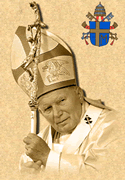|
April 11, 2005
 Personal
Musings Upon A Pope’s Passing Personal
Musings Upon A Pope’s Passing
The Pope is dead.
The last time I heard those words it was late summer 1978,
and I was, briefly, living in a small apartment in the 16th
in Paris. I felt terribly old but was, in reality, very young,
both in years and in spirit – though I don’t know
that I discovered that until later.
John Paul I had become Pope and then, suddenly, passed away
from the scene.
As is customary in papal passings, there were dark conspiracy
rumors that included poisoning or a pillow pressed against
his face by curia bureaucrats who had discovered they’d
made a mistake in letting this particular man ascend to the
throne of St. Peter.
Then, again, he might have just had had a heart attack. I
don’t recall the medical reason supplied for his death.
His reign was notable only for its brevity and that he was
succeeded by the Cardinal from Poland who became John Paul
II, in a deferential nod to the man who had preceded him.
John Paul II. He was a conundrum of a Pope.
I absolutely thought highly of the man on a personal, individual
level. He will, undoubtedly, be a Saint one day and probably
in relatively short order. He certainly acted saintly when,
after months of painful recuperation, he traveled to the jail
holding the man who had attempted to kill him and forgave
him.
He had huge integrity, strong beliefs, acting with the absolute
faith of his convictions. [A bit like our current President.]
He was often, almost always, in fact, charming. He traveled
widely and seemed to have great fun being Pope, at least until
the last few years when Parkinson’s slowed him down considerably
and made his official duties a strain.
For all those things, I must say, I admired him. But I did
not like him. The absolutes of his beliefs dictated that I
could have no place in the church into which I was born. By
very virtue of my being, I must live in perpetual exile from
the faith I once deeply loved.
For the likes of me there could be no place in the Catholic
Communion. Knowing that, I long ago separated myself from
the Holy Roman Church while not divorcing myself from personal
spirituality. In fact, in the desert to which I have felt
condemned, I have found a peaceful oasis, at last, of spiritual
moistness which nourishes me.
Tripp points out to me and all others who were raised Catholics
but who have since parted ways with our Holy Mother Church,
that: once a Catholic, always a Catholic.
I suppose it is true. We are deeply affected, if not infected,
by the discipline of Catholicism in the 20th Century, particularly
if we are products of its educational system. [I am.]
Now that my place in that particular communion is denied
me; I am Adam exiled from the Garden, a sinner by nature and
deed, condemned to forever look back toward Eden, mourning
its loss to me.
Unfortunately, I only wished it had been Eden like. I love
the principles of Christ; I simply wished those who ran the
Roman Church adhered to them a bit more closely. [Ah, if I
sound a tad bitter, I am.]
It is a perverse reality of most lapsed Catholics of a certain
age; we yearn to return to that which we have rejected, even
while knowing that we were correct in our rejection. It is
not the actual we are missing but the ideal we glimpsed in
our first youth, when we could see the true glimmerings of
Christ through the trappings of Holy Mother Church, when the
Sermon on the Mount seemed at the center rather than at the
fringes.
I admired John Paul II for his sense of social justice and
adherence to the Sermon on the Mount while at the same time
I was appalled by his failure to actualize the lesson to be
learned by the Christ’s treatment of Mary Magdalene.
|

















